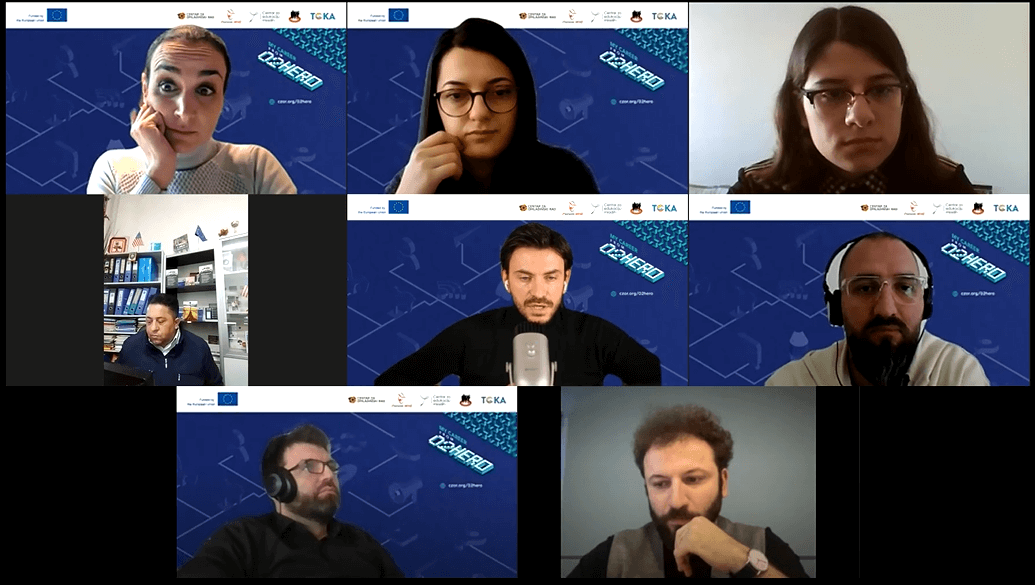The conference “My Career from Zero to Hero” was organized by the non-governmental organization TOKA within the project “My career from zero 2 hero – Strengthening networks of Western Balkan CSOs to implement one-stop-shop youth employability model for future jobs of 4.0. digital revolution”.
The Executive Director of TOKA, Jehona Gjurgjeala, opened the online conference by presenting the main idea of the project, that is, to address the youth unemployment in Western Balkans for future jobs of 4.0. digital revolution. She explained that the project is unique since it includes the implementation of innovative employability model called one-stop-shop methodology.
The one-stop-shop model includes trainings for a set of skills that are taught to NEET youth (young people not in education, employment, or training) in order to be ready for employment opportunities in local and international markets.
“The employability model focuses on providing soft, digital, and entrepreneurship skills as well as career counseling through training and mentorship, which are going to be organized by TOKA in partnerships with six CSOs active in youth development” added Ms. Gjurgjeala.
She informed the participants that in April this year, TOKA is opening the call for application for CSOs. According to her, not only the young people will benefit from this project but also employers, civil society organizations, and other relevant institutions involved.
Moreover, she added that the one-stop-shop youth employability model services to be implemented by the selected six CSOs include:
- Digital skills course for A and B level
- Entrepreneurial skills course
- Online tutorials for digital skills A and B level
- Career counselling
The national mapping study conducted by TOKA together with Next Generation (NGN) Institute showed that the most important skills a candidate must possess are: soft, entrepreneurship, basic computer, technology, and programming skills. Therefore, through this project the NEET youth are going to be equipped with such skills that are the key determinants for a successful job application process.
Session One: The Challenges in Youth Employment
TOKA invited successful CEOs in the field of Information and Communication Technology (ICT) to discuss about challenges ICT sector faces in youth employment for session one. The panel discussion was moderated by the CEO of LinkPLus Mr. Ermal Sadiku. Other panelists were the CEO of StarLabs and Digital School Mr. Darsej Rizaj, the CEO of Frakton Mr. Çelik Nimani.
The ICT sector in Kosovo is striving for a competent workforce. According to Mr. Rizaj, the biggest problem in finding the right candidate for jobs in this sector is the lack of a portfolio as well as poor CV which automatically results in a negative reply. “In today’s rapid growth of technology, young generations have the opportunity to learn about basic computer skills from free online tutorials and they should take advantage of it” emphasized Mr. Nimani.
In order to fill the gap in ICT sector, Mr. Nimani suggests agreements on internship programs between universities in Kosovo and abroad. This will result in highly skilled individuals and open doors for successful job applications. He further recommends that one must specialize in a particular field and only then become a generalist.
Being successful in a job is not about having every skill in place before you start. Skill can and should be learnt. However, people skills that help interpersonal relationships cannot be learnt. According to Mr. Rizaj and Mr. Nimani, nowadays, when hiring they look for both, people skills and technical skills.
Session Two: Possible Solutions for Youth Employment
In order to discuss about potential solutions for youth employment in ICT sector, TOKA invited successful CEO of Kutia, Mr. Arianit Fazliu, and the CEO of United Pixels, Mr. Armend Berisha, as panelists. The panel discussion was moderated by the Senior Intervention Manager of Helvetas, Mr. Alim Halimi.
One of the best ways to enhance knowledge and skills in ICT sector is through training. The lack of technical and creative skills pushed Mr. Berisha to open the training company. He emphasized that is very important for job seekers to focus on attending trainings. He added that through trainings offered in United Pixels, the youth have the opportunity to apply for internship programs that will prepare them for the job market.
In addition, Mr. Fazliu said trainings do not replace schools. However, through trainings is much easier to get a successful job in ICT sector because it makes individuals highly competitive in the job market in terms of the new skills learnt. He further added through trainings in Kutia, a career in IT is being built by a variety of courses offered on development, design, and non-technical with particular focus on IT and Project Management.
He further emphasized that job seekers must see training as a door to enter in a better world. He added that they must integrate the knowledge learnt in schools with the knowledge learnt through trainings.
The conference is part of a regional project entitled “My career from zero to hero- Strengthening networks of Western Balkan CSOs to implement one-stop-shop youth employability model for future jobs of 4.0. digital revolution”, implemented in Kosovo TOKA in cooperation with the Centre for Youth Work (Serbia), Centre for Youth Education – CEM (BiH), Youth for Social Changes – YSC (Albania), and Forum MNE (Montenegro), with financial support from the European Union and implementation of the project is supported in each country by: Montenegro – Ministry of Public Administration of the Republic of Montenegro; Serbia – Swiss government through project “Education to Employment – E2E“ which on behalf of the Government of the Republic of Serbia, is implemented by Social Inclusion and Poverty Unit (SIPRU).

